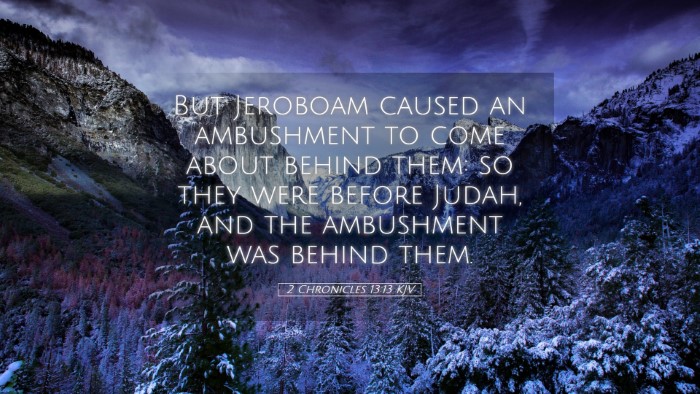Commentary on 2 Chronicles 13:13
Bible Verse: "But Jeroboam caused an ambush to come about behind them: so they were before Judah, and the ambush was behind them."
The verse at hand comes from a historical narrative within the book of 2 Chronicles, which details the reigns of the kings of Judah and Israel, focusing on the covenant relationship between God and His people. The account is rich with lessons pertinent for contemporary reflection, especially in the context of spiritual leadership and the conflicts that arise from disobedience and division.
Contextual Overview
This chapter recounts a pivotal battle between Abijah, king of Judah, and Jeroboam, king of Israel. The backdrop of division between the northern kingdom of Israel and the southern kingdom of Judah is crucial to understanding the tension that unfolds in this narrative. Abijah's approach to warfare, rooted in the invocation of divine favor and covenant promises, contrasts sharply with Jeroboam's reliance on strategic military maneuvers.
Commentary Insights
Matthew Henry's Perspective
Conflict and Strategy: Matthew Henry emphasizes the deceptive tactics employed by Jeroboam. His ambush illustrates the cunning nature of political and military conflict. Henry suggests that Jeroboam’s actions can be understood as representative of the spiritual ambushes that believers may encounter, where external pressures and internal divisions threaten the integrity of God’s people.
Divine Sovereignty: While highlighting Jeroboam’s treachery, Henry also points to God’s overarching sovereignty. He notes how God may use the actions of the wicked for His righteous purposes, turning what appears to be a disadvantage into a platform for divine intervention. This serves as a reminder that despite adversarial circumstances, God remains in control.
Albert Barnes' Analysis
Historical Context and Application: Albert Barnes provides an in-depth analysis of the historical context surrounding this verse. He points out that Jeroboam’s tactics reflect a common theme of division and betrayal in the Israelite monarchy. Barnes emphasizes that divisions within the community of believers often lead to conflict and can be exploited by those who seek to undermine faith.
Moral Lessons: Barnes invites readers to reflect on the moral implications of Jeroboam’s ambush. He suggests that the verse challenges believers to remain vigilant and steadfast, as spiritual ambushes are often the result of complacency. The faithful must guard against the influences that seek to create divisions and distrust among the people of God.
Adam Clarke's Insights
Spiritual Implications: Adam Clarke approaches the text from a spiritual perspective, discussing the implications of ambush in a believer's life. He interprets the ambush as a metaphor for the trials and tribulations believers face, implying that they must be prepared to face opposition, both seen and unseen, while remaining true to their commitment to God.
The Importance of Prayer and Preparedness: Clarke argues that prayer and spiritual preparedness are essential in combating the ambushes that life presents. He posits that, much like the landscape of war, the spiritual life requires readiness to confront various forms of opposition, making reliance on God paramount in times of distress.
Theological Implications
This verse invites theological reflection on several fronts:
- The Nature of Conflict: The ambush represents the struggles inherent in the Christian life, necessitating a deeper understanding of spiritual warfare.
- God's Faithfulness in Disunity: Even in the midst of conflict and division, God’s faithfulness to His covenant people is an assurance that they are not abandoned.
- Call to Vigilance: The actions of Jeroboam illustrate the need for constant vigilance in the life of faith, encouraging believers to seek unity and wisdom in their community.
Practical Applications
In light of the commentary provided, various applications can be drawn for pastors, theologians, and students of the Bible:
- Embrace Unity: Strive for unity within the church, recognizing the threats of division and working proactively to foster community.
- Prepare Spiritually: Encourage practices of prayer, study, and community accountability as foundations for spiritual preparedness against ambushes.
- Trust in Divine Providence: Rely on God’s sovereignty during times of conflict, recognizing that He is the ultimate source of strength and guidance.
Conclusion
2 Chronicles 13:13 serves as a powerful reminder of the dynamics of conflict and the necessity for God’s people to remain watchful and prayerful. The insights drawn from historical commentaries highlight both the pitfalls of division and the assurance of God’s faithfulness amidst chaos. For contemporary Christian leaders and scholars, this verse is an invitation to reflect on our own dependencies and the importance of anchoring our lives in divine truth and solidarity with one another.


